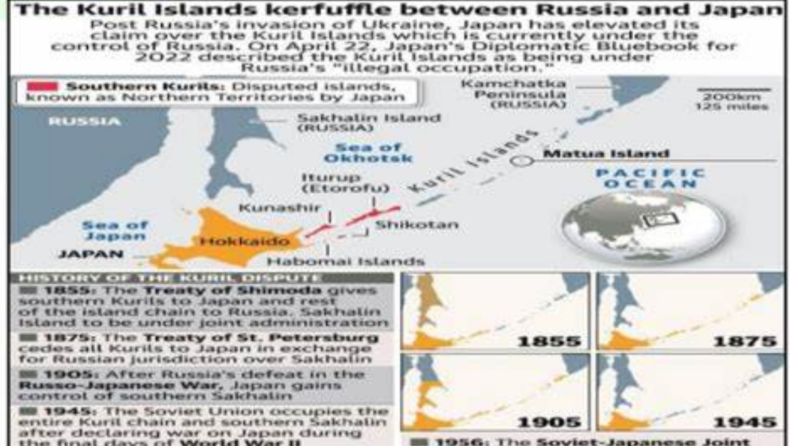The Russian invasion of Ukraine appears to have heightened awareness of Russia’s other disagreements with the West’s allies.

On April 22, Japan’s Diplomatic Bluebook for 2022 denounced Russia’s “illegal occupation” of the Kuril Islands (which Japan refers to as the Northern Territories and Russia as the South Kurils). This is the first time in over two decades that Japan has used this word to refer to the Kuril Islands issue. Since 2003, Japan has used milder rhetoric words, stating that the disagreement over the islands was the primary source of friction in Russia-Japan bilateral relations.
Kuril Islands/ Northern Territories
These are a group of four islands located between the Sea of Okhotsk and the Pacific Ocean, in the northernmost prefecture of Japan, Hokkaido. Moscow and Tokyo both assert ownership over them, despite the fact that Russia has controlled the islands since the conclusion of World War II. At the close of World War II, the Soviet Union acquired the islands and evicted their Japanese inhabitants by 1949. Tokyo asserts that Japan has claimed the contested islands since the early nineteenth century.
What is the bone of contention?
Japan’s sovereignty over the islands, according to Tokyo, is confirmed by several treaties, including the Shimoda Treaty of 1855, the 1875 Treaty for the Exchange of Sakhalin for the Kuril Islands (Treaty of St. Petersburg), and the Portsmouth Treaty of 1905, which was signed following Japan’s victory in the Russo-Japanese War of 190405. Russia, on the other hand, asserts its sovereignty through the Yalta Agreement (1945) and the Potsdam Declaration (1945), and contends that the 1951 San Francisco Treaty establishes Japan’s recognition of Russian sovereignty over the islands. Japan had “renounced all right, title, and claim to the Kuril Islands” pursuant to Article 2 of the pact.
Japan was presumably swayed by worries of a Russia-China alliance, given Japan’s territorial conflicts and tense relationship with China. Japan, on the other hand, maintains that the San Francisco Treaty cannot be employed here because the Soviet Union never signed it. Japan refuses to acknowledge that the four disputed islands were originally a member of the Kuril chain.
Given Japan’s territorial disputes and difficult ties with China, fears of a Russia-China alliance influenced Japan. However, Japan claims the San Francisco Treaty cannot be used since the USSR never signed it. Also, Japan denies that the four contested islands were once part of the Kuril chain.
Both Moscow and Tokyo have not officially ended WWII hostilities owing to dispute over these islands. The Soviet Union got the islands after WWII. A peace treaty was never signed, despite the fact that both countries signed the Japan-Soviet Joint Declaration, reestablishing diplomatic ties. Later, the USSR hardened its stance, refusing to accept a territorial conflict with Japan. Until 1991, when Mikhail Gorbachev visited Japan, the USSR denied the islands as a territorial problem.
Have attempts at resolution been made?
There have been various attempts to terminate the dispute since 1991. Under Prime Minister Shinzo Abe’s leadership, the potential of joint economic development of the disputed islands was examined. As stated in the 1956 Japan Soviet Joint Declaration, both states agreed to bilateral negotiations.
According to the 1956 declaration, Russia was willing to repatriate two Japanese islands, Shikotan and Habomai, if a peace deal was signed. Japan sought to deepen connections with Russia to diversify its energy supply, while Russia sought to increase its customer base and attract foreign investment. But nationalist sentiments on both sides prevented a resolution.
What comes next?
Russia invaded Ukraine shortly after which Japanese Foreign Minister Hideki Uyama complained that Russia had “occupied” the southern part of the Kuril Islands, violating international law.
Japan has been a staunch ally of the West in battling Russian aggression.
The declaration in its Diplomatic Bluebook on April 22nd will further worsen the two nations’ ties. Given Japan’s territorial disputes and tight ties with China, fears of a Russia-China alliance probably persuaded Japan.
Second, Japan may have seen this as an opportunity to further isolate Russia and paint it as a “repeat violation” of international law.
Finally, Tokyo may have adopted this stance because it feels the invasion of Ukraine exposes the futility of Kuril Island reclamation.
Japan’s new Kuril strategy will only worsen bilateral ties with Russia and increase the chances of China and Russia joining forces against it.
Published by: Gargi sharma
Edited by: Aaradhana Singh













